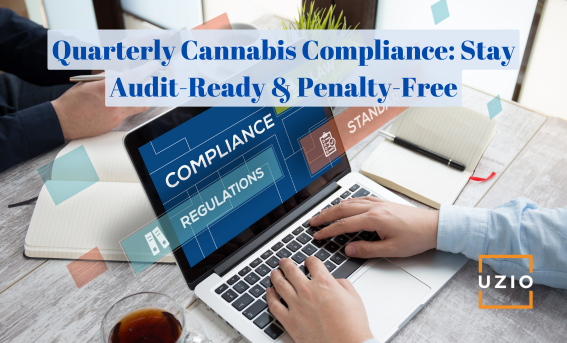Quick links
- Introduction: Why Compliance is a Moving Target
- Quarterly Compliance Checklist: Breaking It Down
- Leveraging Automation & Technology for Compliance
- Building a Proactive Compliance Culture Within Your Team
- Conducting Quarterly Self-Audits for Compliance Readiness
- Leveraging Technology for Seamless Compliance Management
- Conclusion: Future-Proofing Your Compliance Strategy
1. Introduction: Why Compliance is a Moving Target
The cannabis industry is constantly evolving, and so are its regulations. Unlike many other industries, cannabis businesses operate under a mix of federal, state, and local laws that can change frequently. From tax obligations like IRS 280E to strict seed-to-sale tracking requirements, dispensaries must stay vigilant to avoid penalties, fines, or even the loss of their business licenses.
🔹 Why is compliance a moving target?
- States revise cannabis tax laws and introduce new excise duties.
- Federal discussions on rescheduling or decriminalization could impact payroll and banking.
- Licensing and operational regulations shift based on evolving industry standards.
For dispensaries, staying ahead of regulatory changes isn’t optional—it’s essential for survival. The best way to manage compliance effectively? A quarterly compliance review. This proactive approach ensures businesses stay on top of changes rather than scrambling at the last minute.
In this guide, we will discuss the issue and challenges faced by the cannabis companies and how to use the checklist to streamline the operations.
2. Quarterly Compliance Checklist: Breaking It Down
Cannabis regulations are complex and ever-changing. A structured, quarterly compliance checklist helps dispensaries proactively adapt to new tax laws, payroll regulations, and operational mandates without disruption. Below is a quarterly compliance breakdown to keep your dispensary fully compliant.
Q1: Laying the Groundwork for Compliance
- Renew State & Local Licenses – Check renewal deadlines for dispensary, cultivation, and processing licenses.
- Tax Form Submissions – Review annual IRS 280E filings, excise tax calculations, and payroll tax submissions.
- Payroll & Benefits Audit – Ensure compliance with state wage laws, overtime pay, and payroll deductions.
- Employee Training – Update staff on the latest compliance regulations, customer ID verification, and product handling protocols.
- Inventory & POS System Check – Ensure seed-to-sale tracking software is correctly syncing with POS and payroll systems.
Q2: Mid-Year Compliance Check
- Regulatory Update Review – Stay ahead by tracking changes in state laws, tax rates, or new federal guidelines.
- Security & Surveillance Compliance – Ensure dispensary video surveillance and security protocols meet state-mandated requirements.
- Dispensary Banking Review – Work with cannabis-friendly financial institutions to maintain compliance.
- Data Security & Record-Keeping – Ensure secure storage of payroll, employee, and sales records for audit readiness.
- Health & Safety Inspection – Conduct a full dispensary safety audit to comply with occupational health laws.
Q3: Operational Adjustments & Tax Planning
- Payroll & Taxation Adjustments – Prepare for year-end tax deadlines, new payroll deductions, and benefits administration.
- Staff Compliance Training – Conduct refresher training on HIPAA compliance, cannabis sales laws, and age verification.
- POS & Inventory Compliance Check – Ensure real-time tracking of sales, inventory, and waste disposal in accordance with state regulations.
- Audit Your Hiring Practices – Verify Form I-9, employee work authorization, and payroll tax classification to avoid HR compliance issues.
Q4: Preparing for the Next Year
- End-of-Year Financial Reconciliation – Review profit/loss statements, tax credits, and deductible expenses for IRS reporting.
- Employee Record Compliance – Update W-2s, payroll tax forms, and benefits enrollments for the new year.
- Compliance Strategy for Next Year – Identify anticipated regulation changes and create an action plan for implementation.
- State & Federal Audit Readiness – Ensure all documentation is in place in case of a state tax or labor audit.
By following this structured quarterly compliance checklist, dispensaries can proactively adapt to new regulations while reducing financial and legal risks. Next, let’s explore how to stay ahead of compliance challenges with automation and technology.
3. Leveraging Automation & Technology for Compliance
Staying ahead of regulatory changes can be overwhelming, but automation and smart technology can make compliance effortless for dispensaries. By integrating payroll, POS, inventory, and compliance software, businesses can reduce human error, streamline reporting, and ensure real-time regulatory adherence.
How Technology Supports Compliance
- Automated Payroll Compliance – Payroll software ensures accurate tax deductions, overtime calculations, and employee classification compliance.
- Real-Time Tax Calculation & Reporting – Integrated tax tools automatically update to reflect state-specific excise taxes, 280E considerations, and payroll obligations.
- POS & Inventory Tracking – Seed-to-sale software syncs with POS systems to prevent inventory discrepancies and track sales limits per state laws.
- HR & Labor Law Compliance – AI-driven HRIS tools can track labor laws, update employee handbooks, and flag non-compliant scheduling practices.
- Audit-Ready Recordkeeping – Cloud-based systems securely store sales data, employee records, and tax filings for instant retrieval during audits.
Why Automate?
- Reduces Human Error – Minimizes manual tax miscalculations, payroll discrepancies, and compliance blind spots.
- Saves Time & Money – Automates regulatory reporting, reducing the burden on HR, finance, and compliance teams.
- Prepares for Audits – Ensures all financial and regulatory documents are securely stored and easily accessible.
- Adapts to Regulation Changes – Cloud-based platforms update in real-time to reflect new cannabis laws and tax policies.
By leveraging automation, dispensaries can simplify compliance while focusing on growth. Next, let’s discuss how to build a proactive compliance culture within your team.
4. Building a Proactive Compliance Culture Within Your Team
While automation plays a crucial role in maintaining compliance, a well-trained and compliance-conscious team is equally important. Dispensary staff must be aware of regulatory changes, understand their responsibilities, and actively contribute to a culture of compliance.
Key Elements of a Strong Compliance Culture
- Regular Compliance Training – Conduct quarterly training sessions on state and federal regulations, safety protocols, and tax updates to keep employees informed.
- Clear Policies & Procedures – Create a comprehensive employee handbook that outlines standard operating procedures (SOPs) for age verification, cash handling, tax documentation, and METRC reporting.
- Compliance Checkpoints in Daily Operations – Establish a daily, weekly, and monthly checklist to ensure adherence to POS tracking, payroll accuracy, and inventory reconciliation.
- Encourage Reporting & Transparency – Implement an anonymous reporting system where employees can flag potential compliance violations without fear of retaliation.
- Assign a Compliance Champion – Designate a compliance officer or team lead responsible for monitoring new regulations, implementing updates, and ensuring team-wide adherence.
Steps to Reinforce a Compliance-First Mindset
- Gamify Compliance – Reward teams for accurate reporting, error-free payroll processing, and adherence to regulations with incentives or bonuses.
- Audit Your Processes Regularly – Conduct internal compliance audits to catch issues before regulators do.
- Use Compliance Dashboards – Leverage HR and payroll software that provides real-time compliance insights and flags potential issues.
- Foster a Culture of Accountability – Train employees to take ownership of compliance tasks and understand the impact of non-compliance on the business and their roles.
By embedding compliance into daily operations and training, dispensaries can stay ahead of regulatory changes and minimize risks.
5. Conducting Quarterly Self-Audits for Compliance Readiness
Regular self-audits are a proactive way for dispensaries to identify compliance gaps, reduce risks, and ensure adherence to evolving regulations before facing an external audit. A well-structured quarterly compliance audit helps dispensaries track payroll accuracy, tax filings, POS data integrity, and security measures.
Key Areas to Audit Every Quarter
Payroll & Wage Compliance
- Verify employee classifications (full-time, part-time, contractors) to ensure proper tax withholdings.
- Cross-check payroll records with state minimum wage and overtime laws.
- Confirm that 280E tax restrictions are being followed correctly.
POS & Inventory Accuracy
- Ensure that all transactions match recorded sales in your POS system.
- Cross-check product logs with METRC compliance reports to avoid discrepancies.
- Confirm that all product labels, packaging, and advertising comply with state regulations.
Tax & Financial Records
- Review quarterly tax filings, including payroll taxes and sales tax reports.
- Ensure accurate deductions and 280E compliance to avoid IRS penalties.
- Verify that all vendor invoices and employee reimbursements are documented correctly.
License & Regulatory Compliance
- Confirm that state cannabis licenses are up to date and renewal deadlines are tracked.
- Check for any new regulatory updates that may impact operations.
Review security footage and ensure compliance with surveillance and access control requirements.
Sample Quarterly Compliance Audit Checklist
| Audit Task | Responsible Party | Status (✔/❌) |
|---|---|---|
| Review payroll records for compliance | HR & Payroll Team | ✔ / ❌ |
| Verify sales reports align with POS data | Store Manager & Accountant | ✔ / ❌ |
| Check tax deductions for 280E compliance | Accounting Team | ✔ / ❌ |
| Ensure employee licenses & IDs are current | HR Department | ✔ / ❌ |
| Audit METRC and inventory tracking logs | Compliance Officer | ✔ / ❌ |
| Confirm security systems meet regulations | Security Manager | ✔ / ❌ |
Best Practices for a Smooth Compliance Audit
- Automate Audit Alerts – Set up reminders for license renewals, tax deadlines, and compliance updates using payroll and HR software.
- Keep Detailed Documentation – Store all compliance records digitally for quick retrieval during inspections.
- Schedule Pre-Audit Reviews – Conduct mock inspections to identify potential risks before regulators do.
- Collaborate with Compliance Experts – Work with cannabis-specific HR, payroll, and tax professionals to ensure adherence to evolving laws.
By conducting structured quarterly self-audits, dispensaries can detect compliance gaps early, prevent costly fines, and streamline regulatory reporting.
6. Leveraging Technology for Seamless Compliance Management
Managing compliance manually can be overwhelming, especially for dispensaries dealing with frequent regulatory updates, payroll complexities, and tax filings. By integrating technology-driven compliance tools, dispensaries can automate processes, reduce errors, and maintain real-time compliance without excessive administrative burdens.
How Technology Enhances Compliance Efficiency
Automated Tax & Payroll Compliance
- Payroll software automatically calculates withholdings, tracks tax deadlines, and prevents errors in filings.
- Integrations with POS and HRIS systems ensure real-time wage reporting and compliance with labor laws.
- 280E tax compliance tools help dispensaries track deductible and non-deductible expenses.
Regulatory Tracking & Reporting
- Compliance management platforms provide real-time updates on state and federal cannabis laws.
- Automated systems generate METRC and BioTrack reports, reducing manual data entry errors.
- Digital license management helps dispensaries track renewal dates and avoid regulatory lapses.
Secure Documentation & Audit Readiness
- Cloud-based recordkeeping ensures all financial, payroll, and compliance data is securely stored and easily accessible during audits.
- Automated alerts notify dispensaries of upcoming compliance deadlines.
E-signature and HRIS tools streamline the documentation process for employee onboarding and training.
Best Practices for Implementing Compliance Tech
Choose Software with Cannabis-Specific Features – Ensure that payroll, HR, and compliance platforms are tailored for dispensaries and include 280E tracking, multi-state payroll support, and automated tax filings.
Integrate Payroll with POS & Compliance Tools – Streamline operations by syncing employee work hours, tax calculations, and reporting tools for effortless audits.
Train Your Team on Compliance Technology – Make sure employees understand how to input data correctly, track compliance reports, and utilize automated tools effectively.
Conduct Routine Compliance Audits Using Technology – Leverage audit dashboards, automated alerts, and AI-driven compliance monitoring to stay ahead of regulatory changes.
By integrating technology-driven compliance solutions, dispensaries can reduce regulatory risks, improve payroll accuracy, and ensure smooth tax filings.
7. Conclusion: Future-Proofing Your Compliance Strategy
Staying compliant in the cannabis industry requires continuous monitoring, proactive adjustments, and the right tools to navigate evolving regulations. Dispensaries that implement structured compliance checklists, leverage technology, and integrate payroll with compliance systems will reduce risks, avoid penalties, and maintain seamless operations.
Key Takeaways for Compliance Success:
Adopt a Proactive Approach – Regularly review regulations, update policies, and conduct quarterly audits to stay ahead of legal changes.
Leverage Automation & Compliance Tools – Integrate payroll, HR, and POS systems with compliance tracking to eliminate manual errors and improve accuracy.
Train & Educate Your Team – Ensure staff is well-versed in updated compliance requirements, documentation practices, and tax obligations to avoid mistakes.
Stay Informed & Engage with Experts – Subscribe to state and federal cannabis compliance updates, partner with industry consultants, and participate in compliance-focused training programs.
By implementing a structured quarterly compliance checklist, utilizing technology, and fostering a compliance-driven workplace culture, dispensaries can future-proof their operations while ensuring long-term success in the cannabis industry.
Recommended Reading: Biggest pain point with Payroll and HR software
Get in touch with us for an expert-led demo to know more about UZIO all-in-one payroll software.















